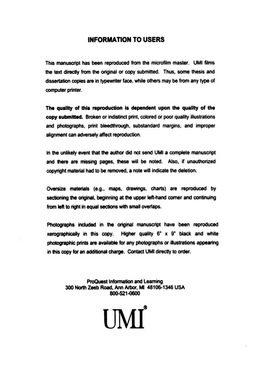| dc.contributor.advisor | Weber, Jerome C., | en_US |
| dc.contributor.author | Bennett, Marcia Moore. | en_US |
| dc.date.accessioned | 2013-08-16T12:18:24Z | |
| dc.date.available | 2013-08-16T12:18:24Z | |
| dc.date.issued | 2001 | en_US |
| dc.identifier.uri | https://hdl.handle.net/11244/374 | |
| dc.description.abstract | Despite an almost equal number of positive and negative outcomes reported as a result of the plans' implementation, the majority of the faculty respondents were accepting of the revised plan, and reported its implementation had no impact on their decision to remain at their institution. | en_US |
| dc.description.abstract | Data gleaned from the medical schools in this study indicated the six medical schools have followed the national trend in medical school compensation by revising their compensation structures to more closely align salary with performance, and to link each component of salary to a component of professional activity (teaching, research, patient care, service). Despite the more direct linkage of salary in faculty compensation plans with the achievement of productivity measures, it was the perception of both faculty and administrators that there had been no significant changes in faculty members' time commitment to, or quality of engagement in, key academic activities such as teaching, research, patient care, service on committees, willingness to mentor junior faculty, and willingness to assume administrative duties. | en_US |
| dc.description.abstract | This study was undertaken to explore how six medical schools in the Midwestern United States are revamping their faculty compensation systems to address these new financial realities. More specifically, the study attempted to determine the extent of changes six medical schools had made to their compensation structures; the portion of faculty salary which is guaranteed by tenure; and the impact the compensation plan changes had on faculty members' time commitment to, and quality of engagement in, teaching, research, patient care, service on committees, willingness to mentor junior faculty, and willingness to assume administrative responsibilities. | en_US |
| dc.description.abstract | The nation's medical schools have a long history of adapting their faculty personnel policies to the economic realities that have confronted them. However, policy adaptations in years past have primarily emerged to accommodate the growth and prosperity experienced by the nation's medical enterprise as a whole. By contrast, today's academic medical centers find themselves caught in a much different situation in which clinical revenues, federal research grants, and government funding, components which comprise up to 75% of the total revenues of the nation's medical schools, are experiencing unprecedented volatility. | en_US |
| dc.description.abstract | Through analysis of compensation structures, data collected from questionnaires administered to medical school faculty and administrators, and from semi-structured interviews, this study provided heretofore unavailable baseline information. Approximately 1,320 questionnaires were distributed---1,200 to faculty and 120 to administrators---at the six medical schools. A total of 422 individuals responded to the questionnaires, representing an overall response rate of 32%. | en_US |
| dc.description.abstract | As economic pressures mount, medical school leaders, faced with burgeoning faculty, shrinking budgets, and the end of age-based retirement for tenured faculty, are also exploring ways to change how they pay faculty. Now that the financial fabric of medical schools is unraveling, funding for faculty salaries is at risk. As a result, the medical school's financial obligation to the tenured faculty member is being revised or redefined at many of the nation's medical schools. | en_US |
| dc.format.extent | xi, 167 leaves : | en_US |
| dc.subject | Medical colleges Faculty Salaries, etc. Southwestern States. | en_US |
| dc.subject | Education, Higher. | en_US |
| dc.subject | Education, Administration. | en_US |
| dc.title | Alterations to faculty compensation structures at midwest medical schools. | en_US |
| dc.type | Thesis | en_US |
| dc.thesis.degree | Ph.D. | en_US |
| dc.thesis.degreeDiscipline | Department of Educational Leadership and Policy Studies | en_US |
| dc.note | Source: Dissertation Abstracts International, Volume: 62-10, Section: A, page: 3246. | en_US |
| dc.note | Major Professor: Jerome C. Weber. | en_US |
| ou.identifier | (UMI)AAI3028802 | en_US |
| ou.group | Jeannine Rainbolt College of Education::Department of Educational Leadership and Policy Studies | |
